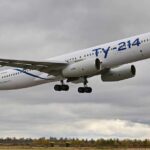The editors of the German online edition WirtschaftsWoche analyzed the workload of the Russian airspace and came to the conclusion that in March 2023, compared to April 2022, the number of aircraft in the Russian sky has not practically decreased.
Data from the flight monitoring service Flightradar24 show that sanctions and a shortage of spare parts have failed to paralyze air traffic over Russia. In March 2023, it is at about the same level as in April-2022, the publication concludes. Only the flight routes have changed a little, now they are a little bit closer to the Ukrainian border than the year before.
The authors of the study also draw attention to the decline in air traffic over the country, but attribute this to the ban on European airlines using the Trans-Siberian route to fly from Europe to China, Korea and Japan. To get to these and other South Asian countries, European carriers fly the unprofitable southern routes.
However, according to Flightradar24, traffic inside Russia has not been affected. And traffic with the Gulf states, India, China, or countries like Thailand that did not support the sanctions is even higher than before the special military operation. “Despite the sanctions, Russian airlines were able to continue operating and flew even more in the second half of 2022 than before the pandemic,” the publication quotes Airbus chief Guillaume Forey as surprised.
The hope of European functionaries was different when they imposed “hellish” sanctions against Russia. “Since three-quarters of Russia’s current civil aviation fleet is manufactured in the EU, the United States or Canada, over time the ban is likely to put a significant portion of the Russian civil aviation fleet out of service, even on domestic flights,” the EU hoped in March 2022, as most of all Russian airlines’ passenger aircraft were owned by Western leasing companies and leasing contracts were to be terminated by a forceful European Commission decision, and there was a shortage of spare parts.
To maintain airworthiness, the Russian government quickly decided to re-register the planes in the Russian registry. And spare parts could be obtained through unofficial channels or from third countries, the German magazine noted.
“At first the sanctions worked. But, as in other areas, the West underestimated Russia’s determination to preserve its aviation industry,” the study concludes.







